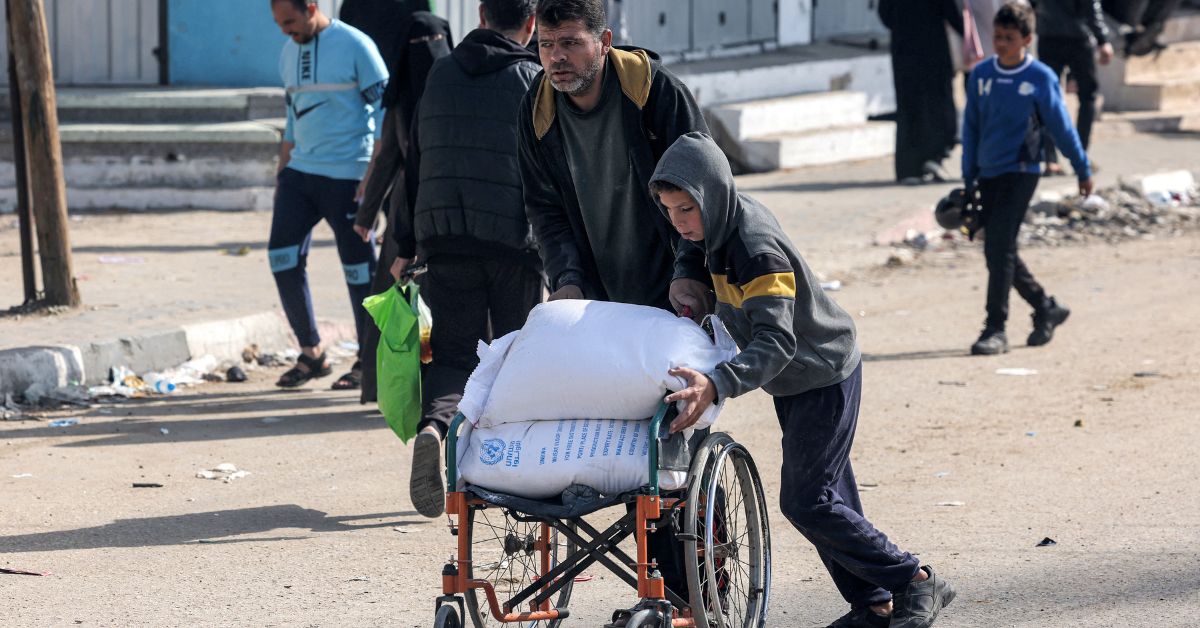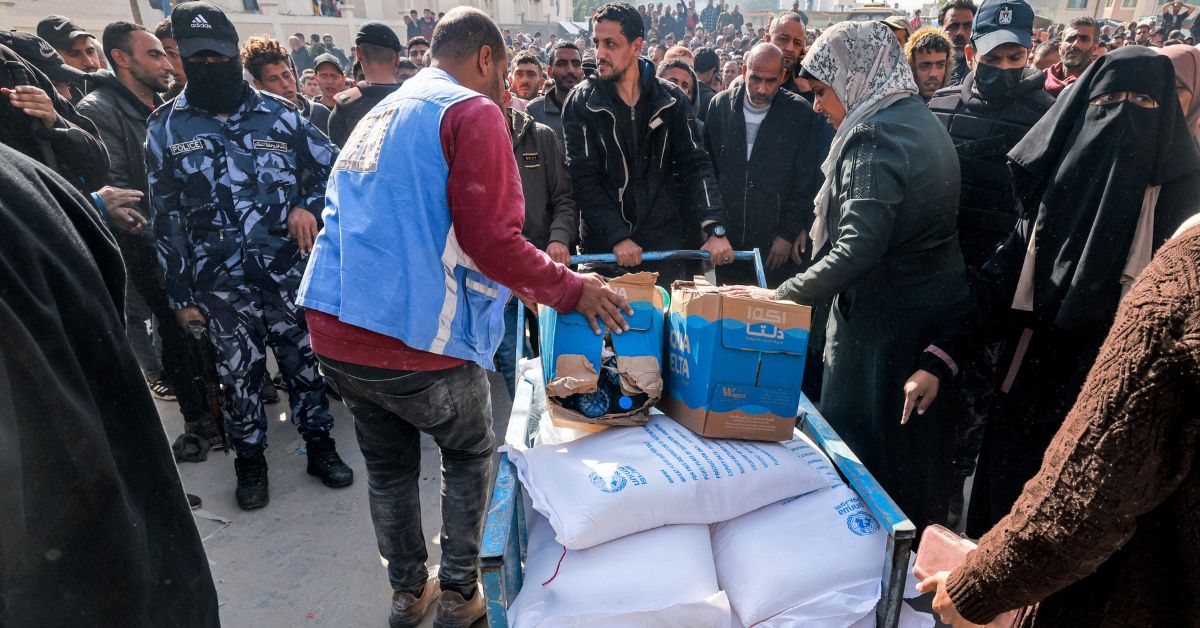GAZA CITY – The recent Israel-Hamas conflict in the Middle East has profoundly impacted the Palestinian economy, leading to widespread devastation, significant loss of life, and a severe economic downturn, according to the World Bank.
Despite Gaza’s modest economic contribution, the World Bank now expects the overall Palestinian economy to shrink by 3.7 percent this year, a sharp decline from its pre-conflict forecast of a 3.2 percent growth. The report indicates that the situation could worsen next year.
The World Bank, which had predicted a growth of 3 percent in 2024, now foresees an overall contraction of 6 percent, assuming the conflict’s severity decreases next year. However, if the conflict continues, the economic impact could be even more severe.
Israel’s robust response to the Hamas attacks on October 7, coupled with the closure of its borders to Palestinian workers from both Gaza and the West Bank, is expected to severely affect the Palestinian economy, the global bank notes.
At A Glance Severe Economic Impact: The Israel-Hamas conflict has led to significant devastation and a downturn in the Palestinian economy, as reported by the World Bank. Economic Contraction: The World Bank projects a 3.7% shrinkage in the Palestinian economy this year, down from a predicted 3.2% growth, with potential worsening next year. Increased Economic Severity: If the conflict continues, the World Bank anticipates a further economic contraction of 6% in 2024. Border Closure Effects: Israel’s closure of borders to Palestinian workers from Gaza and the West Bank is exacerbating the economic crisis. World Bank's Support Package: A $35 million package has been announced to meet Gaza's immediate medical needs. Decline in Gaza's Economic Role: Gaza's contribution to the Palestinian economy has dropped from 36% in 2005 to 17% last year. Widespread Economic Devastation: The conflict has resulted in job losses, reduced trade, heightened restrictions, and deepened poverty across Palestinian territories. Labor Market Challenges: The Palestinian labor market faces severe issues, including unemployment and reduced consumption levels. Fiscal Challenges for the PA: The Palestinian Authority struggles with institutional and fiscal challenges, compounded by declining international aid. Sector-wise Impact: Major damage to Gaza’s ICT, health, education, and commerce infrastructure, with significant declines in agriculture, forestry, and fishing sectors. Banking Sector Resilience: Despite the crisis, the Palestinian banking sector remains stable, though non-performing loans are expected to rise. Urgent Need for International Support: The World Bank emphasizes the critical need for global support to address the ongoing crisis and support future reforms. Humanitarian Crisis: The conflict has resulted in significant loss of life and widespread displacement in Gaza.
The World Bank has announced a $35 million support package to address the immediate medical needs of the population in Gaza. Pending board approval, this package aims to provide “emergency relief for the affected people of Gaza,” as stated by the World Bank.
Gaza’s share in the overall Palestinian economy, which includes the West Bank, has decreased from about 36 percent in 2005 to just 17 percent last year, as reported by the Palestinian Central Bureau of Statistics.
Economic devastation and reduced growth
The conflict has led to a significant decline in economic activity across the Palestinian territories. The war has not only resulted in the loss of lives but has also devastated critical infrastructure in Gaza, casting a shadow over economic activities in the West Bank.
Declining incomes, job losses, dwindling trade, heightened restrictions, and salary cuts have dampened growth, pushing many Palestinians into poverty. The current crisis exacerbates pre-existing structural weaknesses, and efforts by the international community to address them have been largely unsuccessful.
Labor market and fiscal challenges
The labor market in Palestine has been severely affected. Incomes have plummeted due to unemployment, declining trade, increased movement restrictions, and temporary public salary reductions. This situation has significantly reduced consumption levels, which had been the primary engine of economic recovery post-COVID-19.
The Palestinian Authority (PA) faces monumental institutional and fiscal challenges, including a lack of resources and dependency on aid, which has been steadily declining over the past two decades.
Impact on various sectors
The conflict has caused extensive damage to several sectors. In Gaza, approximately 60 percent of ICT infrastructure, health, and education facilities, and 70 percent of commerce-related infrastructure have been damaged or destroyed.
The agricultural, forestry, and fishing sectors have also experienced significant declines. In addition, the conflict has led to massive displacement, destruction of homes and assets, and a deep recession, pushing more Gazans below the poverty line and deepening poverty for those already vulnerable.
Banking sector resilient
Despite the challenges, the Palestinian banking sector remains resilient. The banks are well-capitalized and have adhered to international standards.
However, risks are on the rise, with non-performing loans projected to increase following the recent crisis.
The Palestinian Authority’s growing reliance on arrears could disrupt liquidity flow to suppliers, potentially increasing the non-performing loan ratio.

Urgent need for global support
The Palestinian territories remain structurally dependent on aid, and without a significant shift in approach, they are expected to continue facing structural fiscal crises.
The support of the international community is crucial, not only in the current emergency context but also for future pro-growth reforms and fiscal consolidation efforts.
Immediate actions, including the cessation of hostilities, reinstating revenue transfers, facilitating trade and private sector activity, and increasing international financial support, are essential to prevent a dramatic recession and further economic deterioration.
The conflict, ignited by Hamas’ cross-border attacks on October 7 that killed 1,200 people, as reported by Israeli sources, and resulted in about 240 hostages being taken back to Gaza, is now entering its third month.
The human cost of Israel’s intense response has been significant: More than 18,400 people in Gaza have been killed, the majority of them women and children, according to the Hamas-run health ministry.
The UN estimates that 1.9 million of Gaza’s 2.4 million population have been displaced by the war, half of them children.
This displacement followed Israel’s overwhelming aerial bombardment in the days after October 7, which was later accompanied by a ground invasion targeting Hamas.
(With agency inputs)








